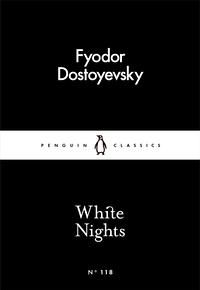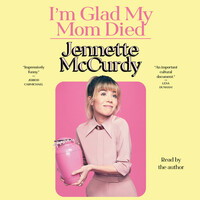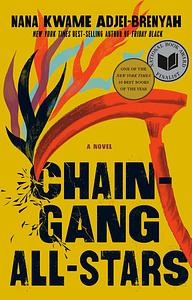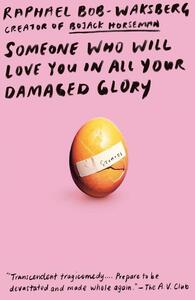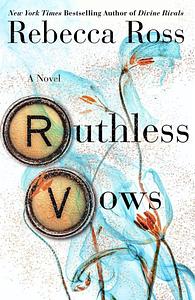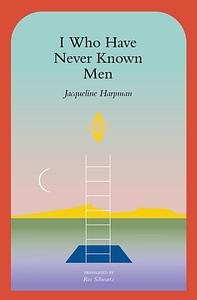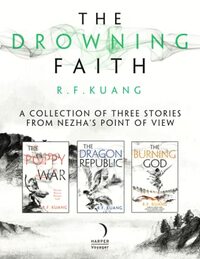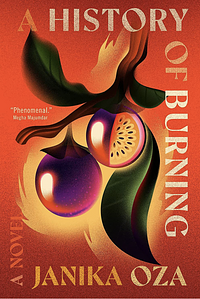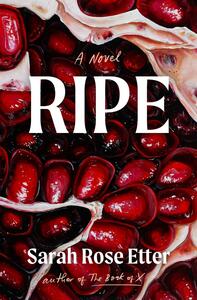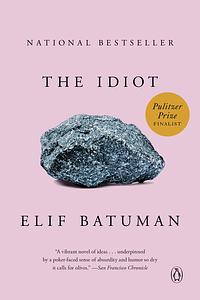You need to sign in or sign up before continuing.
Take a photo of a barcode or cover
bloop's Reviews (102)
Strong character development:
No
Loveable characters:
No
The MC is just a loser lmao. I guess I just didn't really understand the book. Was Nastenka all a dream? I'm confused. I still hate the instalove trope. I get that it's a short story but I didn't like how the relationship was not developed well. I really want to try other Dostoevsky books though, this one just wasn't for me. I probably need to re-read to understand why everyone likes it so much.
You never really know what a person is going through. All her years on television, you would never guess that she was fighting a battle against herself and against the toxicity of her mother. I'm so glad she's doing better now.
fast-paced
Strong character development:
Complicated
Loveable characters:
Complicated
Diverse cast of characters:
Yes
hope I don't get flamed for this, but Chain-Gang All-Stars was unfortunately an underwhelming read. No doubt, Nana Kwame Adjei-Brenyah is a talented writer, but the way the story was written just didn't resonate with me as well as I would have liked it to. The message was great, but it was just bogged down by the pacing of the book and the addition of too many characters that were hard to keep track of. However, I can't really tell if this was the book's fault or just a symptom of me reading 3-4 books at the same time. We may never know. I also felt like the message was almost too blatant at times; I think Adjei-Brenyah should have trusted the readers more to suss out the themes rather than spell it out for us. On the other hand, I really like how Adjei-Brenyah juxtaposed footnotes of real-life events to events in the book because it really shows how these themes translate to the reality of the American carceral system and the consequences of late-stage capitalism. I definitely have mixed feelings about this book, so not sure if I would recommend. Depends on what you're looking for, I guess.
I liked this book. It was really great to read 1-2 stories before bed each night but a lot of it was forgettable or went over my head. There were definitely some ~hopecore~ quotes in there that kind of inspired me, but for the most part it was meh. Though it's clear that Raphael Bob-Waksberg has a lot of talent and his writing style was in my opinion, pretty funny and unique.
And I thought about how, actually, if you wanted to, you could say the same thing about life. That life is terrifying and overwhelming and it can happen at any moment. And when you’re confronted with life you can either be cowardly or you can be brave, but either way you’re going to live. So you might as well be brave.
The best story was Rufus. I just liked being inside the mind of a dog and I think it is pretty accurate.
medium-paced
Plot or Character Driven:
Plot
I liked the conclusion to this duology, but felt it lacked a little oomph. I was pretty shocked during certain reveals but everything just tied together too nicely in the end, and some of the plot points just worked out too conveniently. Additionally, I am usually one to get emotional about character deaths. However, in this book, I did not really feel an ounce of sadness because I was not connected to said characters. I don't know. I usually have a lot to say in my book reviews but yeah idk rn. Typically, this kind of book would receive a 3.25 star rating from me, but I think it had a lot of entertainment value which boosts this up to a 3.75.
Something inconsequential that annoyed me: Why the hell is the god's name Dacre?? It's so goofy omg and every time he is mentioned I am only thinking of dacre montgomery from stranger things. So essentially I'm picturing Dacre as Billy. He haunts me. He should've been named something more menacing and devious like idk, achlys or something not fucking dacre
Something inconsequential that annoyed me: Why the hell is the god's name Dacre?? It's so goofy omg and every time he is mentioned I am only thinking of dacre montgomery from stranger things. So essentially I'm picturing Dacre as Billy. He haunts me. He should've been named something more menacing and devious like idk, achlys or something not fucking dacre
mysterious
reflective
sad
There is something to be said about how one girl, having what most of us would consider our "humanity" stripped away from a young age, still displays tendencies intrinsic to human nature. This speculative fiction novel unfolds against the backdrop of a society, or the absence thereof, markedly distinct from any of our present realities, yet it reveals an enduring human capacity to seek curiosity, love, and hope. While the ultimate answers to questions about what truly happened in the book elude us, this very uncertainty contributes to the brilliance of I Who Have Never Known Men a literary masterpiece that, remarkably, maintains its contemporary relevance despite having been written nearly 30 years ago.
The way Harpman writes is beautiful; she had me highlighting so many good passages. It's kind of a meta commentary on human nature if you think about it. While reading the book, I never gave up the prospect of a positive resolution, defying the overwhelming evidence to the contrary. This resilience mirrored that of the unnamed narrator. I left the book with more questions than answers, but perhaps that is the whole point. That the book is an allegory for life itself.
Another small note: the ebook cover is absolutely beautiful. I hated it at first for its perceived simplicity, but later realized that it artfully reflects the narrator's lack of exposure to the necessary language for precisely articulating her observations. Consequently, as readers, we are presented with only the most rudimentary portrayal of her surroundings.
The way Harpman writes is beautiful; she had me highlighting so many good passages. It's kind of a meta commentary on human nature if you think about it. While reading the book, I never gave up the prospect of a positive resolution, defying the overwhelming evidence to the contrary. This resilience mirrored that of the unnamed narrator. I left the book with more questions than answers, but perhaps that is the whole point. That the book is an allegory for life itself.
Another small note: the ebook cover is absolutely beautiful. I hated it at first for its perceived simplicity, but later realized that it artfully reflects the narrator's lack of exposure to the necessary language for precisely articulating her observations. Consequently, as readers, we are presented with only the most rudimentary portrayal of her surroundings.
fast-paced
Plot or Character Driven:
Character
“She’s the only divine thing he’s ever believed in. The only creature in this vast, cruel land who could kill him. And sometimes, in his loveliest dreams, he imagines she does.”
Nezha <3
Nezha <3
adventurous
hopeful
reflective
sad
tense
medium-paced
Plot or Character Driven:
A mix
Strong character development:
Yes
Loveable characters:
Yes
Flaws of characters a main focus:
Yes
One of my favorite books that I read for high school English class was A Fine Balance by Rohinton Mistry, which detailed the lives of four characters from different backgrounds during The Emergency in India. What I loved about it was how it felt like I got to know each character very intimately and how all of their stories were intertwined. While reading A History of Burning, this sense of familiarity like I had read something similar already, kept bubbling up (in a good way). It wasn't until after I finished the book and read about the process behind how Janika Oza wrote the book that it made sense. Oza notes that one of the books she was inspired by was A Fine Balance, and looking back, the echoes of Mistry's writing can be seen in the book.
God, how I love multi-generational familial epics. I was floored at every twist and turn of the book, and Janika Oza writes with so much heart. All the characters had their own distinct, fleshed-out personalities, which I was amazed by because she managed to do this in 400ish pages whereas Mistry did it in 600+. It was also rewarding as a reader to see how each character's past experiences and trauma directly contributed to their actions. Trauma wasn't thrown in there for the sake of it; each scene described was written with meticulous intention.
Janika Oza masterfully finds a balance between poetry and prose, writing intricately without getting lost in the magniloquence that some authors tend to fall into. Within A History of Burning, we get little nuggets of wisdom that speak to human nature and the immigrant experience, which made me appreciate my own parents who immigrated to the US some time ago.
Some readers are grumbling about the different Swahili and Gujarati phrases that Oza sprinkles into the story, and while I understand that it could be confusing, it should by no means detract from the overall rating of the story. It's not hard to pull out your phone and Google it. (And oftentimes, the meaning of those words, or at least the general idea of them should be able to be figured out through context if you aren't clinically stupid.) It is a gift for us readers that Oza is sharing this story with us — the story would honestly be bogged down and diluted if she spent time explaining every little word. Even more, it is Oza's love letter to people from East African and Indian culture, and I would imagine that their enjoyment of the book would be lessened if time was spent explaining cultural words they already know. Just my two cents.
Anyways, this novel is a masterpiece. I feel so blessed to have read two 5-star novels back-to-back since I don't give those out easily. I will be screaming my recommendation for A History of Burning from the rooftops!
God, how I love multi-generational familial epics. I was floored at every twist and turn of the book, and Janika Oza writes with so much heart. All the characters had their own distinct, fleshed-out personalities, which I was amazed by because she managed to do this in 400ish pages whereas Mistry did it in 600+. It was also rewarding as a reader to see how each character's past experiences and trauma directly contributed to their actions. Trauma wasn't thrown in there for the sake of it; each scene described was written with meticulous intention.
Janika Oza masterfully finds a balance between poetry and prose, writing intricately without getting lost in the magniloquence that some authors tend to fall into. Within A History of Burning, we get little nuggets of wisdom that speak to human nature and the immigrant experience, which made me appreciate my own parents who immigrated to the US some time ago.
Some readers are grumbling about the different Swahili and Gujarati phrases that Oza sprinkles into the story, and while I understand that it could be confusing, it should by no means detract from the overall rating of the story. It's not hard to pull out your phone and Google it. (And oftentimes, the meaning of those words, or at least the general idea of them should be able to be figured out through context if you aren't clinically stupid.) It is a gift for us readers that Oza is sharing this story with us — the story would honestly be bogged down and diluted if she spent time explaining every little word. Even more, it is Oza's love letter to people from East African and Indian culture, and I would imagine that their enjoyment of the book would be lessened if time was spent explaining cultural words they already know. Just my two cents.
Anyways, this novel is a masterpiece. I feel so blessed to have read two 5-star novels back-to-back since I don't give those out easily. I will be screaming my recommendation for A History of Burning from the rooftops!
I legit can't remember a lot about this book but I remember there were some good quotes in there somewhere. Girlboss capitalist hellscape
reflective
slow-paced
Plot or Character Driven:
Character
It's absolutely remarkable how a book that is just living on dreams and vibes with no plot in sight was simply a delight to read (even if it did take me three weeks). This is proof that a boring book is not inherently bad.
I felt transported in time, like I was somehow back in college as my 19 year-old self with no sense of what my place was in the world. I honestly still feel like that sometimes, as if COVID froze my mental age. At the same time, this book also perfectly encompassed a lot of thoughts and concerns I had in high school. Reading The Idiot made me relive the anxiety behind texting a boy whose thoughts I could never quite figure out... It quite literally put me in her mindset and got me rooting for this idiot man to just date her already even though he did lead her on and treat her poorly. I've never experienced the latter of course, but I just felt like I did when reading. There are so many pithy quotes and observations that Selin, the main character, makes that made me feel so seen. Thoughts that I once perceived as shameful or unique to myself, but in retrospect, it's perhaps just the girlhood experience. And I love that.
I felt transported in time, like I was somehow back in college as my 19 year-old self with no sense of what my place was in the world. I honestly still feel like that sometimes, as if COVID froze my mental age. At the same time, this book also perfectly encompassed a lot of thoughts and concerns I had in high school. Reading The Idiot made me relive the anxiety behind texting a boy whose thoughts I could never quite figure out... It quite literally put me in her mindset and got me rooting for this idiot man to just date her already even though he did lead her on and treat her poorly. I've never experienced the latter of course, but I just felt like I did when reading. There are so many pithy quotes and observations that Selin, the main character, makes that made me feel so seen. Thoughts that I once perceived as shameful or unique to myself, but in retrospect, it's perhaps just the girlhood experience. And I love that.
"It seems to me that your sense of other people’s awfulness might be compensating for your own sense of inferiority and fear of rejection. You rationalize the rejection of your peers by telling yourself it comes from other people’s deficiencies rather than your own. They can’t understand your philosophy or your ideas."
"It was true that I wanted to be unconventional and say meaningful things. At the same time, I felt very strongly that the problem was bigger than that. Something basic about language had started to escape me."
There are sooo many other quotes I could include but I'll keep it to a minimum.
Elif Batuman has a certain knack for describing irrelevant shit in long detail, but it's somehow enjoyable? At times it becomes superfluous but not enough to annoy me. Also, I found Selin to be hilarious. Like her internal monologue is just a bunch of intrusive thoughts sometimes or cheeky observations that have me dying. I'm sure this next one won't seem as funny without surround context but whatever.
"A student asking a question was sitting in an amazing posture: legs crossed at both the knee and the ankle, arms intertwined, elbows on the desk, fingers knit together, like his whole organic being aspired to be a French cruller."
Like come awn that's hilarious. Selin is a judgmental shit sometimes but it's so perfect and funny and so me. Love, love, love.
